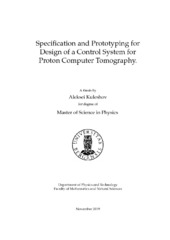Specification and Prototyping for Design of a Control System for Proton Computer Tomography.
Master thesis
Permanent lenke
https://hdl.handle.net/1956/21101Utgivelsesdato
2019-12-12Metadata
Vis full innførselSamlinger
- Master theses [168]
Sammendrag
Proton Computer Tomography (pCT) is a new imaging modality. It based on proton with matter interaction. Treatment with protons is used already against cancer, as it offers the possibility to give a high dose to the tumour, while at the same time deposit a very low dose to the surrounding tissue. Imaging with protons improves the accuracy of the dose planning. However, there are no commercial pCT scanners available in the market today. At the Department of Physics and Technology at the University of Bergen, a new generation of a Digital Tracking Calorimeter (DTC) is designed. It is a significant part of the pCT system. It is a highly complex device designed with 41 layers of ALPIDEs, a Monotholitic Active Pixel Sensor. It is more than 4000 ALPIDEs in the design, and they will be read out and controlled by 41 custom readout units. A control system is required, both to configure the system and to monitor vital health parameters such as temperatures, current and voltages during operation. During this thesis, prototyping has been done to find the best solution. At the time of writing, the DTC is still under development, so the work covers tests of communication protocols and prototyping of a monitoring system with randomly generated data. Various options of communication protocols for the pCT control system has been tested in this thesis.The work of this thesis has shown that the best option for the pCT control system will be the use of OPC UA communication protocol as it is a standard industrial protocol of communication. An OPC UA information model for the pCT has been developed. The XML design file has been imported to a commercial SDK.
